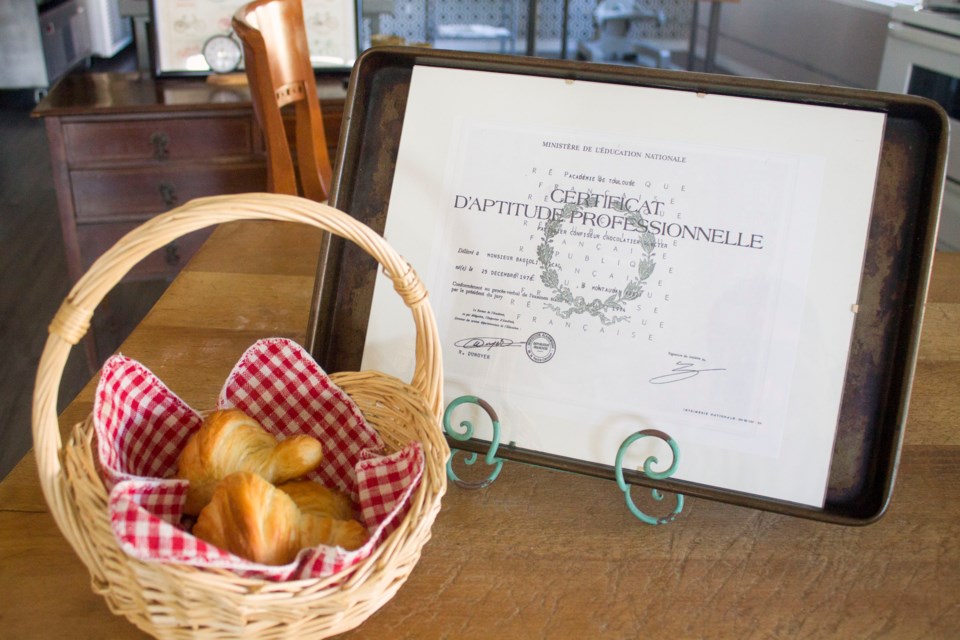With National Croissant Day landing on Jan. 30, Cochrane’s premier un-baked goods establishment, Pascal’s Patisserie, wanted to share the story and delve deep into the creation of the iconic French baked pastry.
The local patisserie in Cochrane has a unique approach behind its business model that allows customers to take home and bake the traditional goods that are flash-frozen in their studio.
Pascal Bagioli is a classically trained pâtissier and tourier, from Toulouse, France. He has over 25 years of experience in the art of baking pastries and has created millions of the tasty treats by hand. His business partner and fellow pastry lover, Lison McCullough, is originally from Montreal and shared the story behind their business with The Eagle.
“Basically, we had operated in Calgary for five years between 2011 and 2016,” McCullough said. “We were catering to a more wholesale market doing boutique hotels and restaurants, and that kind of thing.”
McCullough and Bagioli ultimately became a victim of their own success while operating in Calgary, as the work became very demanding and unsustainable for such a small team.
“When you are a genuine artisan, one person doing everything, it just became too much,” McCullough said.
“Short story is, we ran away to France, and we just wanted to forget about everything. Afterwards, we thought, ‘You know what, we are missing our pastry-making and our pastries.’”
Upon returning to Alberta to find a new home for their passion project, the pair encountered several roadblocks that made it difficult to kickstart their business
“When you are an artisan, on your own, making everything with passion, it is very difficult to convey to suit people that what you do is good, despite [having] five or six years of experience in business,” Bagioli said. “We started from zero.”
After searching far and wide and receiving what they called a blessing from the pastry gods, McCullough and Bagioli found a new home in Cochrane. Seeing the community in a new light, they agreed the town provided the right balance of life and work for their business model.
“That’s what we were after this time – was to keep our balance,” McCullough said. “We want to do this. We love our pastries.”
At the time Pascal’s Patisserie first opened, McCullough said 80 per cent of pastries like croissants were made industrially in France. Unlike the baguette (which was recently granted intangible cultural status by UNESCO) they believe the croissant should have some form of recognition to help preserve the iconic French pastry.
“People think croissants are everywhere, of course they are,” McCoullogh said. “They are being made industrially all around the world, but there’s no recognition of their character and how good this pastry can be.”
Although croissants appear to be simple in nature, Bagioli outlined they are a very difficult pastry to make properly. It requires the skills and knowledge of a baker and pastry chef, which is an art he feels is slowly being lost due to the continuous shift toward mass-production.
“You have line machinery that can make…65,000 [croissants] an hour, or you have one person making 100 croissants in 3 hours,” Bagioli said. “It is passion that stands between those two things.”
Bagioli said many artisans like himself continuously hone their craft. He feels the work creates a unique experience that customers can take home.
“We are dedicated to this,” he said. “It takes a long time, longer kneading, good temperature, the texture of the dough and the butter have to play together, and after the rest is in your kitchen.”
Unlike traditional frozen baked goods, Bagioli has adapted his recipe in a way that takes into account the special fermentation process alongside the humidification of the flour that he works with. He outlines it has to be changed every week in order to reach a specific consistency.
“It’s just a constant balance of flour, water, butter, and texture,” Bagioli said.
The patisserie uses a transitional organic flour from Quebec that is unique to Canada and has no performing-enhancing additives.
Any imbalances can greatly affect the outcome of the pastry, and for Bagioli, when a shift happens, it no longer is a croissant.
“It should be very light, and it should tell a story you touch it,” he said. “When you bite it, it should have another story to tell.”
Both McCoullough and Bagioli are proud they were able to return to their craft and share their work with customers in Cochrane.
Although it goes against the traditions for a French patisserie to relinquish control to their customers, they both agree their business allows anyone to partake in a traditional croissant while experiencing the story behind their pastries.
“Our story is their story,” McCoullogh said. “Because without them, we just have frozen lumps of dough.”



